Issue Number 15, Winter 2011-12
Contents
- Northing by Clara Quinlan
- After Apples, Listening by Tom Sheehan
- Chinook Coming Home by Penelope La Montagne
- Folding Together by M Jackson
- Oak Tree Grove by Allegra Jostad Silberstein
- Rebellion of the Salinas by Robert Coats
- Release by Lissa Kiernan
- Remnants by John Smith
- The Deep Frozen Desert by David Chorlton
- The Night the Crickets Began To Sing by Gail Larrick
- Tree-Trimmers by Eileen Malone
- Wind as Conceptual Artist by Lois Marie Harrod
Archives: by Issue | by Author Name
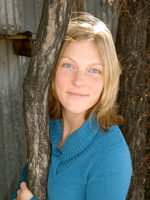
Northing
by Clara Quinlan
Clara lives in the Front Range of the Rocky Mountains, where Longs Peak looms in the near distance and Coal Creek cuts dramatically across the land.

Isn’t the ice in the distance traveling,
doesn’t it know of my approach,
the red, jagged trees a painter’s stroke
sweeping from the highway, rushing over
each hill. This far, have I already come
without you, a faint disappearance
into black, brittle limbs
collapsing from fire, here
a turn to marrow, to my own interminable
exit; have I not coveted you, dark drifts
on the tongue, spine icicled, mindless,
my body endures, the scallops of mountains blued
without trees, the river’s green glass
advancing from the glacier, spilling against
the road, isn’t it cracking, isn’t it
heaving, when was I told to wrest the song,
pass through in mute, alkaline and silt,
breath’s vaporous fingers
a new hour, an unknown stage, the ice
far above and tremulous. When I place
my hand upon the chandeliered river
enter this: while there is still time, tell me
--
how might the end be spared? Hands
indulgent, bucketing all that is strewn
wild, trafficking your many forms, the barren
flesh sings, crystallized, trees tilt
and claw at the relics of light. Spooling up,
a congregation of
white butterflies from the grasses
render the air, demand reprieve against
the vast, the tundra
uninterrupted, glaciers yawning into kingdoms and how
might the slight wing survive?
To put my mouth upon
the prayer that keeps you
and devour, your fingers struck gold my love
--
with conquering. Let nothing come
between, our stride thickened under
jagged bush, gnarled shoots
mask the creek we search for, we hear
as glass clinking somewhere into
collapse. You who know no end.
The earth will refuse, rocks caught
under sponged lichen beneath our feet as if
the ground should boil. Sky cobbled
in thermals insisting solitude. Give up
your small narrative as time measures itself
only in the empty space our bodies
cleave. A colony of Kittiwakes rises
from the broken black stalks, hip high,
syntax of wings scattering the luckless
vapors of cloud, do not mistake this
for mercy, joy you can attend, the vital damp of green
banished. Toward indulgence, the tendriled snow
atop the mountain cuts its host in faint bones.
Where bounty still abides, bring me
--
born from winter, a system of white mapping the flesh
unwanted, feathered and receding, how far
again should I have followed? You,
wealth of debris, gild the sutured room;
windtorn and willing, I hunger beyond frozen waters.
© Clara Quinlan
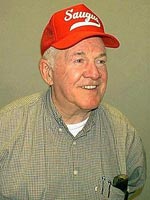
After Apples, Listening
by Tom Sheehan
Tom lives in a house built in 1742 about 200 feet from the Saugus River in the Saugus River Watershed bounding 900 acres of the Rumney Salt Marsh and 450 acres of a wetland, Reedy Meadows.

They have all gone now,
the fire engine-red Macintosh,
under batter with cinnamon,
gone to day school
on yellow buses
with brown-baggers,
or bruised to a freckled
taupe and plowed under
for ransom and ritual.
Some have had the life
crushed out of them
for Thanksgiving cup.
Standing on the stiff lawn
downwind of winter,
I drop the first cold
moon of November
into a fractured wheel
of apple limbs
and hear the bark
beg away.
A pine ridge,
thicker than a catcher’s mitt,
grabs half the wind
riding off Monadnock
and squeezes out
wrenching cries that hang,
like wounded pendants,
on necks
of far, thin stars.
Deep in the Earth,
in a thermal tube
of its own making,
an earthworm grows
toward a rainbow trout
sleeping under ice
and waiting to be heard,
or the last of an apple’s pips
still this side of the grass.
© Tom Sheehan

Chinook Coming Home
by Penelope La Montagne
Penelope lives on the banks of the Russian River between Del Rio and Camp Rose just east of Healdsburg, California. She has learned most of what she knows from watching the river, in all her moods, flow by.

Slapping their way through nature’s bath water
sea lion and great white in their rear view,
salt water still purging as they advance
in a mystical mitochondrial alignment
they come frothing in the shallows
facing off with water’s potent wisdom
vaulting themselves into jagged uncertain
winter creeks in upcountry backyards
to set a constellation of eyeballs
into the gravel bed that finally
dams them in too and becomes
an altar of reddened flesh,
while the garnet bark
of western dogwood
stands witness to the ritual
They come undone and in their slipstream
the eagle long since missing from these parts
the sight of him snags our breath
those wide wings the bullet body
the single focus the waiting banquet
the seduction of his winning pose
distracts us from the mass grave
drenched in new world crimson.
the last golden leaves of willow create
a shroud of calico light flickering
They come undaunted into our midst
showing us what is savory and wild
in us around us about us – chinook
swimming up from the beginning of time
*The headlines of the Santa Rosa Press Democrat, November 14, 2002, touted the return of 5200 chinook salmon counted passing under the Wohler Bridge over the Russian River, on the way to their breeding grounds upstream. Chinook were thought not to be native to this area because of their prolonged absence, until DNA tests showed that this area is indeed home territory for them.
© Penelope La Montagne

Folding Together
by M Jackson
M Jackson currently braids her life around three watersheds: the vibrant Taiya River watershed of Southeast Alaska; the Clark Fork watershed of Montana, and the Nisqually River watershed that cradles her father's farm in Washington State.

I get panic attacks.
When my mind has had enough, my body folds. By fold, I mean, I tend to bend like a lawn chair at the waist and lock. My brain insulates itself by building minor blockades and my knees ratchet up to my chest like a draw bridge.
I have had two fold-overs in two days, a record for my life. The first I was yelling at a friend in the swampy A.M. hours, and the second I was opening a jar of rice in the kitchen. I was warned with a twinge, a revolt of the muscles in my calves— warning enough to drop the glass jar to the top of the table before sinking to the floor. There I lay, staring out the window at the hill across town lanced with snow and winter wilt, scared and tired but sensible enough to wait this one out.
***
Recently I heard two prominent environmental experts speak about climate change. Both clearly outlined the problems, issues, and facts of climate change. At the end of the lectures, each expert offered a solution. One said joy, the other, passion. Joy and passion will answer climate change.
When pressed, the experts offered switching light bulbs as an additional solution.
How frustrating. Every climate change-related lecture, or book, or podcast I listen to of late seems to fully elucidate the problems we face— but misses the big picture.
In the face of the enormity of it all, the worst case scenarios we’ve heard over and over that include sea level rise, thawing permafrost, various special extinction, outbreaks of disease and famine and war, I am frustrated at being told to change my light bulbs, check my tires, adjust my thermostat, or unplug the toaster when I’m not home.
It feels trivial.
It is trivial.
Climate change is massive, undulating— a complex complexity. As an active member of society, it is belittling to be told that my capabilities extend and end at a light switch. Or worse yet, as our individual lifestyles directly contribute to and exacerbate climate change: I am advised by the experts to find and follow my own joy or passion. This is bad advice. Frankly, these beacon scholars of climate change should be using their scientific soapboxes to encourage us to get off our bottoms. The last thing our society needs as a take-home message about climate change is one extolling the virtues of myopic individual joy-chasing.
I’ve been thinking about panic a lot lately, since it seems my fold-overs are increasing in general regularity. We panic, the books tell me, as a reaction to a sudden overwhelming fear. Perhaps. But I think it’s more complex. Panic, rather, to me, is my body’s way of saying time out. The body is cinched into stasis, everything slows down, and while I’m on the floor resembling a crushed lawn-chair, my brain reboots.
A reboot is good. After the last two fold-overs I’ve spent a great deal of time sneaking around what I think caused them. This reflection is a new start.
Sometimes panic is an appropriate response. It gets you out of danger.
I wonder what would happen if the whole human race panicked. Together. Right now. If all the propaganda campaigns Exxon Mobile created about climate change weren’t effective, and the science and facts were accessible and digestible. What would happen if every human being on this planet could look at one another and say that climate change is happening, that it is caused by human society’s carbon emissions, and that it is solvable through utilization of clean energy, which is entirely within our capacity and grasp. But, if we don’t move now, and I mean now, our planet will be unrecognizable to our children. Not our grandchildren, but our actual children. The next generation. What if we could say this, each of us, and as we did, panic bloomed in our stomachs and hearts?
Would this prompt immediate action, or would we give in and fold-over?
I’ve noticed in the midst of my fold-over, my mind resigns quickly. I try to move one of my claw-hands or stop my knee from wedging itself under the ribcage. These efforts fruit no reward. My mind pipes in and says there is nothing I can do. You are, actually, stuck here for the rest of your life. You are powerless to change, to free yourself.
It is so much easier to give up: To say to yourself: We are not smart enough to handle this problem. We cannot act together. It is beyond us. We will remain here on the floor with our knees tucked into our ribs.
Last weekend I walked into our pastures with my dad to check on a cow. She had isolated herself from the herd and was tucked down in a grassy bowl. It’s calving season at the farm, so we went to see if we had a new calf.
Walking the pastures with my dad is akin to walking into sanctuary. I’ve been walking these spaces with him my entire life, and as we walk a comet tail of memories and friends and family trails us in spectral form. I find spiritual peace in the damp turf, in the foggy cedar bogs that line the fences, in the company of my father.
My dad speaks in low tones of this year’s rotation strategy, of which pastures the cows appear to favor this season, of where he saw the elk the evening before. We sink down in the mud by the gate and he tells me about the new drainage system he’d like to put in place, one with a bobble sump-pump up by the main barn. In two, maybe three years, he thinks, he could have most of the run-off redirected so it doesn’t gather in this low spot by the gate.
My dad has three-to-six months of life left. He knows this, and I know this. He isn’t in denial, though he appears to have found peace with inescapable reality.
And so we walk out into the pasture. Dad talks about the cows, about the registered brand he is filing with the state. We approach the downed cow and she lurches to her feet, revealing the little black calf beside her. The placenta hasn’t passed yet, and the calf’s hooves are still white. It is minutes old.
What I know is this:
If I focus on the pending death of my father, I will miss the life he has now, and the life he has lived’ and the moments, hours, days we share right now, like this one. If I focus on the event, it defines him, his life. My father is more than his death. Death is the details, but my father is everything else.
There is so much more than the details directly within eyesight.
My father could turn inward, become so burdened by the knowledge of his death that he stops living. Every loss requires choice. He could turn away from us, his family, his farm, his cows; he could give in and up.
If we turn away from each other in the face of climate change, from our communities and our nations and our world, we will lose it all in individual acts of shortsightedness. If we focus just on light bulbs, or on singular individual action, or a pending death, we’re not going to ever be able to fully address the challenge before us.
Why must we look at climate change as the Apocalypse? This is too narrow, too limiting. If we look at climate change and see only the dark arm of God, only Mordor, only the guilt and blame and corporate greed: we give ourselves to the details and fold-over into the darkness.
Auden Schendler, sustainability director for Aspen Skiing Company, writes that “climate change offers us something immensely valuable and difficult to find in the modern world: the opportunity to participate in a movement that, in its vastness of scope, can fulfill the universal need for a sense of meaning in our lives.”
Schendler inspires me.
I am not immobilized. Rather, I am inspired and empowered by this challenge. There is so much we have the capacity to do that is beyond light bulbs. Our biggest assets today are our feet and mouths and minds. Individuals, in concert with the rest of humanity, can drive, instigate, and push for change. Bill McKibben famously said, “By all means, go screw in that efficient light bulb, but then, go screw in a new senator.”
Humanity should be having a fold-over, a panic attack, now. We have so little time left. We should be inspired by the examples of Tunsia and Egypt. Mass protests led to extreme social overhaul in eighteen days. Organized on Facebook and YouTube.
How do we do this here? We mass and protest and demand action of our government. Those with the loudest voices, those scientists and writers, philosophers and artists, speak up. Keep doing what you’re doing, talking about this planet, our environment, climate change. But while you’re up there at the pulpit, while you’re talking about ice sheets and floods and radiative forcing and carbon caps and joys and passions, start talking about what we can do together and how we can do it. Stir us up, impassion us with the gloat of possibility. Challenge us to imagine harder, to get organized, to demand, to use Facebook, YouTube, Twitter, Google, our mouths and minds and feet.
Tell us that what we do as a nation matters, that we are capable, that our only limitation is the breadth of our imagination. Demand that we wake up and walk out, that we meet at this place at this time, that as a society we protest, demand, and hold out until it happens. Because it will.
My dad has requested flowers for spring. When we walked back up the pasture from the newborn calf, he talked about the flowers he loves.
And so this is what I do.
I order online pounds and pounds of sunflowers, Indian Blankets and Teddy Bears, Black Oils and Mexican Reds. I order Bachelor Buttons, Chrysanthemums, Dahlias, Alyssum, Marigolds, flowers and more flowers.
When they arrive nestled tiny in paper packets, I will plant them in beds of sandy soil and nurture them to adulthood. I will do this because it is doubtful my dad will see this spring, and if he does, what he must see is color and flowers. Before he meets the Author of All Things, he must be surrounded by the flowers of his life. And I order seeds online and go to the kitchen to make rice but instead fold over under the weight of this. And when it is through, and I stand up, I walk back into the living room of my apartment, sit down at my desk, and order more seeds. Cornflowers and Calendulas and Larkspur. For my dad. For spring.
© M Jackson

Oak Tree Grove
by Allegra Jostad Silberstein
Allegra lives on a secluded acre of land near Putah Creek on the outskirts of Davis. Even though it is lots of work she feels very much at home here because she grew up on a farm in Wisconsin.

Thanksgiving Song
From seed to root to lofty branches
eternity resides: seen and unseen
in the gathering years.
Rest in the sacred grove.
Deep roots for endurance,
deep the river beneath the earth
that flows in the heartwood
where birdsong gathers in circling years.
The trees more space than solid matter
hold the breath of spirit,
hold memory of the tribe,
hold the seed of evolution.
Rest in the sacred grove,
let spirit enter,
let memory, past and future,
change your heart.
© Allegra Jostad Silberstein
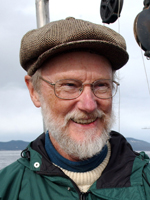
Rebellion of the Salinas
by Robert Coats
Bob lives in the watershed of Blackberry Creek, a small urbanized but partially-restored tributary of San Francisco Bay. He may also be found occasionally in the Tahoe basin, where he is studying the impacts of climate change.

Dammed and diverted,
chattering kingfishers exiled,
floodplain furrowed to carbody-revetted banks
the River of Steinbeck trickles
between silt-choked pools, ammoniacal
nightmare of cladoceran agonies:
Aldicarb, Diazinon, Malathion.
Now high in the Santa Lucias
lowering clouds cloak dark peaks.
Slanting rain weaves gray veils
over the chaparral of the barrancas,
soaking the chamisales of the Nacimiento,
San Antonio, Tassajara
and the green shoulders of Soledad.
Runoff gathers in swales
surges the creeks and arroyos,
pulses the mainstem. Leaping overbank
the river nudges sandbags, concrete rubble,
braids delicate ribbons of sediment
across laser-leveled fields, cutting
new channels among the artichokes.
The flood recedes;
clean silt glistens in the pale sun.
At the river's new edge
in runes written
by a stalking heron:
seeds of willow
seeds of cottonwood.
Originally published in the Pudding House anthology Fresh Water--poems from the Rivers, Lakes and Streams
© Robert Coats

Release
by Lissa Kiernan
Lissa lives in Brooklyn near the Narrows, a tidal strait which separated the once-connected Staten Island and Brooklyn some 15,000 years ago.

People in the community were generally unaware that the river was radioactive, although it had been noted that since the reactor opened, the river never froze.
– Citizens Awareness Network, Shelburne Falls, MA
We were told it was clean. It looked clean, smelled clean.
It even tasted clean. We bought the watercolor
renderings of idealized blues, fearlessly rafted the rapids.
Poked the contamination into holes, pulled beers,
listened to heavy-metal. If our boats floated uncertainly,
at least our lives wrung out tidy and sterile.
But as it cut a gash through downtrodden towns,
even the sunniest had to admit our poor river
did not so much flow as skulk. Even brilliant days
reflected inert gray. All but the hardiest life forms—
Walleye, Lake Chub, Longnose Sucker—
refused to sign the liability waiver.
Yet in the daily struggle of unbecoming, our clannish lives
barely stir. And for trout anglers, a slug’s released
each morning. A sinking sensation follows slipstream:
We drank the river today. We’ll drink it again tomorrow.
© Lissa Kiernan
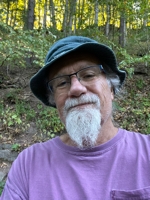
Remnants
by John Smith
John lives on the New Jersey side of the Delaware River in the Lower Delaware watershed.

If my father were alive and driving,
he would have pulled over
on the shoulder, braved traffic,
then threshed through the downcast
corn rows and cropped
the blackened sunflower
nodding among them.
He would twine it to an eyehook
in the basement beam to dry out
for future arrangements
alongside of motherwort, milkweed,
snakeroot, carrion flower, wormwood,
heal-all, Queen Anne’s lace,
angelica, and sweet everlasting.
My father rummaged all four seasons,
but there was something about fall
he had to gather and salvage,
something he needed to maintain.
He believed in the afterlife
of remnants and practiced
the art of arranging the remains.
"Remnants" was published in the New Jersey Audubon
© John Smith
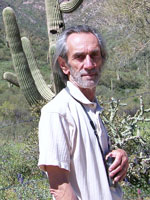
The Deep Frozen Desert
by David Chorlton
David lives close to the Sonoran Desert in central Phoenix in the Lower Salt Watershed, at an elevation of 1,124 feet with an average annual rainfall of 7.7 inches.

Beneath the ice light of the northern sky
in a mountain six hundred miles
from the nearest tree,
where frost runs deep into stone
and the only star is a signal
from a disappeared world
the seeds of a desert go along
the blue tunnel for storage
in a vault where they wait
for springtime to flower
from snowdrift and memory.
Here is mesquite and a crystal
of cold to preserve it; here
are prickly pear and sage
held in trust for the day
when the sun reappears; here
are agave and ironwood labeled
with ink that glows in the dark
like each golden segment
in the scorpion’s tail
and the hourglass of fire
on the spider who crawls
between the stacks
of silver packages bearing
the indestructible seal
of night-blooming hope.
A copy of this poem has been interred along with some seeds from Arizona at the Global Seed Vault in Svalbard, Norway.
© David Chorlton

The Night the Crickets Began To Sing
by Gail Larrick
Gail lives in Northern California in the Russian River watershed. The landscapes of Ohio, Utah, the Arizona deserts, and California provide deep sources for her work.

The last spring frogs burrow into mud,
leaving behind a few nights
of silence. Moon
behind dark clouds etches the sky
with masks, draperies of light.
After the silent nights
a ringing quiver of crickets fills
evening just after dusk. A new song,
played like a bow across a violin,
starts, stops on a single note.
What came before silence is forgotten.
Silence is forgotten.
Only the song of the crickets
contains the night,
calls out.
Stay awake, stay with the music
we make. Hear how we sing
in waves, layers of sound,
a chorus that moves
over grass in the dark.
Something, someone passes.
The music stops. A leap of silence
as loud as the crickets opens the night,
a long rest
before the song goes on.
© Gail Larrick
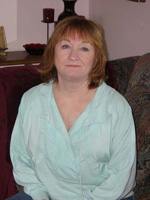
Tree-Trimmers
by Eileen Malone
Eileen lives in the fog of the San Francisco Coastal South Watershed.

This morning
homeowners association tree-trimmers
came with trucks, chainsaws, policies
and procedures, bylaws
according to the work order
it was supposed to be only a trim
yelling over the blare of their radios
they cut down tree trunks
their felled branches in full flower
alive, breathing
torrid tangles of glistening green
strung with nests
hauled off to the local dump
now, the afternoon hush is brittle
a great silence lingers as an afterthought
a memory of song, of feathered rustle
the air left behind has emptied itself of birds
against a sky clotted blue
one songbird circles and squawks,
circles and cries out
flaps and circles.
© Eileen Malone

Wind as Conceptual Artist
by Lois Marie Harrod
Lois lives in the Stony Brook watershed in Hopewell, New Jersey, a sweet little town that has been here since the l8th century. Though close geographically, it seems far from the turnpike-oil-refinery New Jersey.

At first it was enough
to form and reform clouds
all day, a Zen experience,
breathing OOM into the firmament
and many of his productions
though temporary
went through startling shifts,
but isn’t surprise necessary?
So Wind spent years exploring
the possibilities of mist, vapor, fog
and when he had accumulated
any number of cumulus
and grown cirrusly bored,
he picked up grit to sand knobbly pines
down to barren plain,
sculptures which Rock recorded
with his there was
and there may have been stolidity.
Since Rock,
a slow and careful craftsman,
didn’t document everything
that Wind was tossing around,
so much, too much, gone with the wind,
recently Wind began to thread plastic bags
through beech and aspen trees,
something a little more permanent,
an idea he had gotten from Water,
who was adept at weaving bottles and boxes
into mats of rushes and reeds.
Once in awhile Wind
blew an empty trash can down the street
for its uncanny rumble,
but he usually let Flood float its contents
onto someone’s mired stoop
where Mud could etch it.
Wind noticed that Ocean
was also focusing on found objects,
an huge installation of tampon shells and rubber ducks
off and on a beach in Madagascar.
That was all right, Wind supposed,
they all had to borrow from each other,
but sometimes he grew angry
at the pale imitations–
and blew through a gallery or museum
like a typhoon,
leaving creative chaos in his wake.
Some critics panned
these works as piles of junk,
but others suggested they gave
the rest of the conceptual artists
more to work from.
After these rampages, though,
Wind would often envy
the quiet works of Puddle
who managed to recycle
Wind’s clouds with a tree or two,
but generally Wind thought
Puddle was minimal and derivative.
Puddle needed a bigger canvas.
It was Cold though
who most irritated Wind,
Cold, so adverse to change,
Cold who had lately taken up
photographing an ice cube
not melting. What was wrong
with him? Cold better wake up
to what was going on
in the Art World, ice as a medium
was so passé, the whole
planet was heating up,
and those polar sculptures
of his were melting
bear by bear.
© Lois Marie Harrod